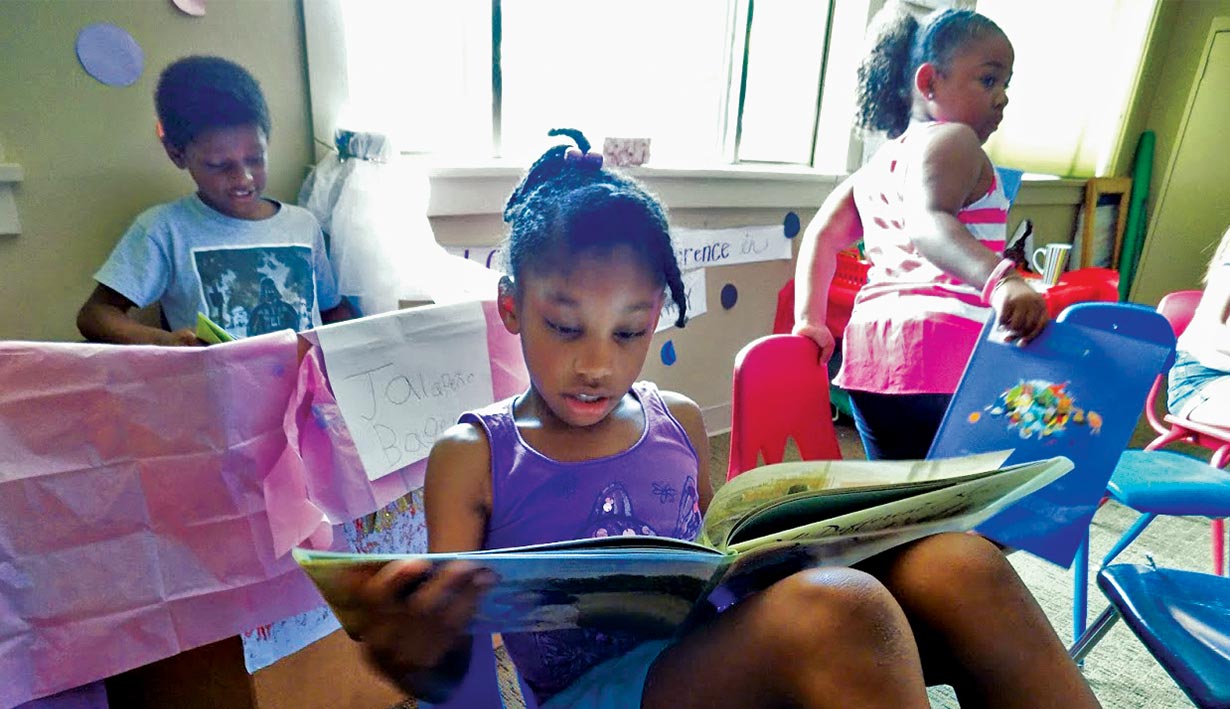The City Urban Perspectives
Empowering Kids Through Summer Reading
Seattle Pacific students teach and lead in Freedom Schools
By Ruth Moon | Photo courtesy of Urban Impact
 Scholars at the Freedom Schools program (pictured here in 2015) spend summer days immersed in reading.
Scholars at the Freedom Schools program (pictured here in 2015) spend summer days immersed in reading.
In a church classroom in South Seattle, 50 first- to seventh-graders paused amid an energetic morning gathering to remember the people killed by police in the U.S. over the last two years.
The moment, prompted by the death of Philando Castile the night before, highlights Seattle Pacific Seminary student Martin Saunders’ commitment to facing tough subjects in the Freedom Schools summer learning program he is facilitating at Rainier Avenue Church. Students continued discussions in small groups later that morning.
“We talk about whatever’s in the room,” he says. “It’s in the news. It’s all over social media. It’s already in the room so we’re going to name it.”
Students were gathered for a morning of reading-based learning for students enrolled in the six-week Freedom Schools program. Developed nationally by the Children’s Defense Fund and hosted locally by Christian community development nonprofit Urban Impact, the program helps prevent the learning loss that can occur while students are out of school.
The literacy-based curriculum emphasizes culturally diverse perspectives and making a difference in self, family, community, country, and the world. After harambee, the morning gathering, students split up into small groups for reading-based classroom learning before lunch. After lunch, they learn about science, art, and other topics through hands-on activities.
Saunders, who expects to graduate from Seattle Pacific Seminary next spring, said his philosophy of education draws from discussions he had with Associate Professor of Theology Brian Bantum in a class on race, theology, and culture.
“Translation has to happen,” says Saunders, who is white and is working with students from a broad variety of ethnic and cultural backgrounds. “Either I can make these kids code switch to talk my language and understand who I am and my experiences, or I can be about trying to enter into their language.”
The Freedom Schools curriculum emphasizes equality, calling students “scholars” and expecting them to be creative learners. Classroom leaders are trained to act as facilitators rather than teachers.
In one classroom, dubbed “Camp Freedom,” Catherine Moffett ’16 read Green Eggs and Ham aloud to her nine scholars under a blanket fort before gathering them in a circle to explain their next project. In small groups, students would read short biographies to create posters about influential artists and political figures.
Moffett, who will start Seattle Pacific’s master of education program in the fall, is working as a Freedom Schools student leader intern for the first time this summer. She is using tools she learned in SPU courses discussing race, ethnicity, and gender in contexts of sociology, psychology, and education.
“They really grew my passion and also really prepared me,” she says. “I wouldn’t say I was 100 percent prepared, because how can you ever be? But I am a lot more knowledgeable about how class and race intersect in the education system.”
At lunchtime, students tumbled out the church door to run relay races and jump rope in the parking lot and the main classroom. As her first- and second-grade students finish their lunches and jump up to join games, Seattle Pacific senior Diana Cabrera says she is already exhausted but happy with her summer.
“It’s been challenging — there are so many children!” she says. “But I already appreciate the relationships I’m beginning to build with them.”
